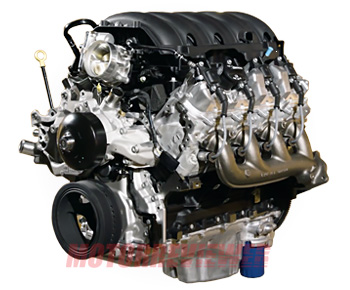GM 6.6L L8T Engine Specs, Problems, Reliability, Info

GM 6.6L V8 L8T Engine Info
The L8T engine (sometimes referred to as "late") is a 6.6-liter, naturally-aspirated, direct-injected, gasoline V8 motor from the Gen V Small Block V8 engine family. The L8T engine was introduced in the 2020 Chevrolet Silverado and 2020 GMC Sierra Heavy Duty pickup trucks, as a replacement for the 6.0-liter L96 Vortec engine (Gen IV). Compared to other members of the fifth-generation Small Block, this engine is built as a workhorse: it has a cast iron cylinder block instead of aluminum, and it doesn't have Active Fuel Management (AFM) or Dynamic Fuel Management (DFM), and an auto-stop function. So, let's take a closer look at the design of the L8T truck engine, specs, its common problems and overall reliability.
Chevy/GMC 6.6L V8 L8T Engine Overview
This 6.6-liter V8 engine was designed to withstand the abuse of a work truck's life. Therefore, it is built around a robust cast-iron block with nodular iron main caps. The engine has the same bore size of 103.25 mm (4.065 in) as Gen5 small block 6.2-liter engines (L86/L87 and others). But the stroke is 98 mm (3.86 in), which is 6 mm (0.236 in) more. This motor also features a forged-steel crankshaft, forged powder-metal connecting rods, cast aluminum domed pistons optimized for direct fuel injection and piston oil jets/squirters.
On top of the iron block, there are lightweight aluminum cylinder heads with two valves per cylinder (16 valves in total). The valvetrain features a pushrod OHV design. So, there is a single billet-steel camshaft inside the engine block that actuates intake and exhaust valves via steel pushrods and low-friction roller-pivot rocker arms. By the way, the L8T has hydraulic roller lifters, so there's no need to manually adjust valve clearances. It is also worth noting that it comes with variable valve timing (a dual-equal camshaft phasing system). Since this is a gasoline direct injection (GDI) engine, fuel injectors are mounted on heads, and they inject fuel directly into combustion chambers. Direct injection requires high fuel pressure to operate. Therefore, there is a high-pressure fuel pump. It is located in the valley between cylinder heads and is driven from the camshaft.
The ignition system features platinum-tipped spark plugs, individual coils, and low-resistance spark plug wires. The intake manifold is made of composite material and is fitted with a drive-by-wire electronic throttle body. Exhaust manifolds are made of steel. As mentioned earlier, the L8T engine does not have any cylinder deactivation features (AFM/DFM) or Auto Stop-Start (ASS) and it only requires regular 87-octane gasoline.
The 6.6L L8P Crate Engine
The L8P is a crate version of the L8T engine launched by Chevrolet Performance in 2022. This engine has the same cast-iron cylinder block, bore and stroke sizes, including a total displacement of 6.6 liters or 400 cubic inches. What makes it different from the L8T is a lot of performance components. The engine's foundation was upgraded with high-flow heads, new valves, unique camshaft based on 6.2L V8 LT2 engine, and pistons. The max revs are limited at 6,000 rpm, which is higher than L8T. It also requires a minimum of premium unleaded fuel (91-octane gas). In the end, this NA 6.6 crate motor produces really impressive power — 523 hp and 543 lb-ft of torque.
Engine Specs
Oil recommendations and capacity may vary depending on the car model, year, and market. Please check the service manual specific to your vehicle!
GM 6.6L L8T Engine Problems
The GM L8T engine so far is the most reliable engine out of Gen5 small block engine family. It is built with time-tested materials and technologies, such as cast iron and forged steel, which ensure its durability. In addition, it lacks problematic and annoying systems like AFM/DFM or start-stop, found in smaller 5.3-liter (L83 or L84) and 6.2-liter GM engines. Nevertheless, it is still a modern GDI V8, and it does have some issues.
Oil Consumption Problem
Some owners have noticed an excessive amount of oil being consumed, typically while towing heavy loads. Oil consumption is sometimes up to a quart of oil per 1000 miles. It is believed that the reason for this is either the thin piston rings, 0W-20 oil or the PCV valve. In any case, it's a good idea to check the engine oil level from time to time and always keep a few extra quarts of oil on hand in a trunk.
Timing Chain Wear
This problem usually occurs because of the previous one. Timing chain failure is often related to the engine running low on oil for an extended period of time.
Carbon Buildup
This is a drawback of direct fuel injection. The L8T, like other GDI engines, is not immune to carbon deposits on intake valves. Premium gas and high-quality motor oil, along with frequent oil changes, can help slow down the carbon build-up process significantly. After all, you can walnut blast it.
Small Issues
Many owners reported that expensive iridium spark plugs do not last very long. Another common problem is a faulty sensor. Most of the time, it is related to a knock sensor (P0325 engine code), but like any modern engine, the L8T can experience issues with various sensors.
GM 6.6L L8T Reliability and Longevity
Drawing the line, is the 6.6-liter V8 a strong, reliable engine? Yes, it is. The naturally aspirated L8T powerplant was built for heavy-duty use, and it has all for it: A durable cast-iron block, a pushrod OHV valvetrain, robust, heavy-duty components, and no faulty AFM/DOD system. The expected lifespan of the engine is approximately 300,000 miles. But keep in mind, how long any motor will last depends on many factors, such as maintenance, driving habits, the quality of oil and fuel, and more.
